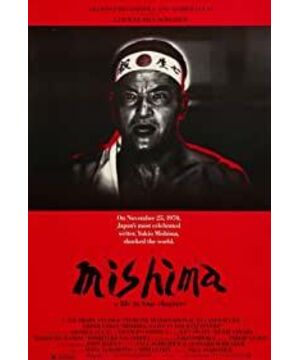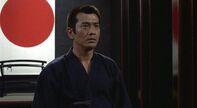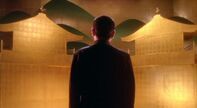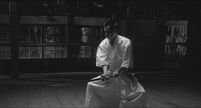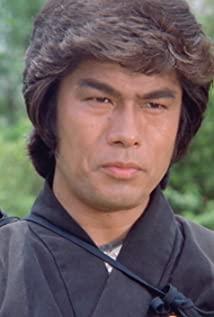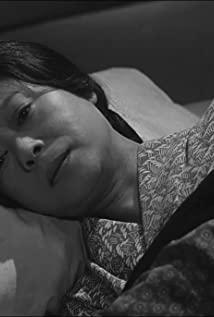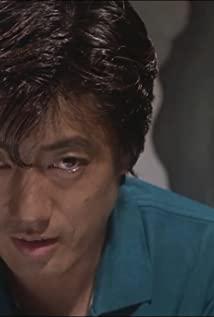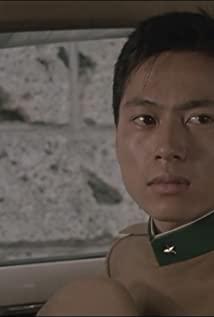Talk less gossip. The Chinese name of the movie added "Biography" after "Mishima Yukio" to replace "Life in Four Chapters", which is undoubtedly very clever. A biography, especially a biography of a writer, will undoubtedly include the writer’s life, interspersed with the writer’s works and interpretations of the works, and finally the evaluation of the author and works, etc., etc., in this movie it can be said to be Everything is available. Therefore, it is quite appropriate to call it "biography". Although the presentation from text to video is no easy task, director Paul Schrader has solved a series of problems very well.
The movie is divided into four chapters, and the whole story is the life of Mishima Yukio. When Mishima was a child, she was raised by her grandmother, who was arrogant and educated, and was extremely strict with Mishima's childhood discipline. This kind of strictness and even deterrence had a great impact on his character. On the one hand, it made him less talking, and on the other hand, it made him weak. The physical and mental deficiencies made him very inferior, and the gradual increase in inferiority caused him to think about beauty and desire to destroy beauty. After adulthood, Mishima gradually found the value of self-existence and restored the desire for physical and mental health, so he began to exercise and regarded it as the art of the human body. However, he also gradually realized that if he wants to be successful in art, he must stop abruptly when it reaches its peak. Only in this way can art survive. As the body and mind became stronger, Mishima continued to achieve success in his career, but none of this stopped him, because self-improvement was no longer his goal. The defeat of the war and the weakness of the country urged him to act politically, so he began to hold political rallies, participate in political discussions, and form radical political groups on his own, hoping to give a weaker country a shot. As a result, Mishima decided to kidnap the leader of the army, threatened death and gave a speech to the army, encouraging the soldiers to loyal to the emperor. However, things were counterproductive. No one was willing to listen to Mishima's remarks and follow Mishima's steps. Under this circumstance, Mishima chose to self-discipline and ended his young life.
The above is the life of Mishima Yukio. This is true of his life, whether it is plain or vigorous, it is a life written on a tombstone, a textbook, or Baidu Encyclopedia. No matter how many psychoanalytic theories you add, how many vocabulary you put out in professional books, it ends here. However, for a writer, his life does not only appear in this kind of objective, bystander mentality of flat narratives, but should appear in the texts he has recorded himself. These texts may have been modified or converted, and may no longer be able to see any clear connection with the author himself, but they must inevitably be branded with traces of the author’s life and inevitably become a hidden place for the author to conduct self-analysis. . They may be fictional phantoms, or they may be real stories in another space. In any case, they should be the most true and illusory portrayal of a writer's life.
As a director who has written many excellent scripts such as "Taxi Driver", "Angry Bull" and "The Last Temptation of Christ", first of all, a successful screenwriter, Schrader must have a deep understanding of this. Therefore, Mishima Yukio's three novels-"Kinkakuji", "House of Mirror" and "Running Horse" are incorporated into the film one by one. In the author's mind, the most successful part of the film is the way it handles these three novels and Yukio Mishima's own experience. If Mishima, who intends to kidnap generals in reality, and Mishima who recalls teenagers and youths in reality, constitute two dimensions in the timeline, then the timeline of the entire life of Mishima and the timeline of the characters in his works have formed. Contrast of two parallel spaces. In the film, the color is responsible for the construction of time: color represents the current Mishima, black and white represents the Mishima in the memory; and the setting is responsible for the construction of the space: the real scene represents Mishima’s own life, surrealism The virtual scene outlines the environment in which the characters in the novel are located, such as the Golden Pavilion Temple surrounded by wallpaper, the same height as the people, the continuous flow of people in circles and rows of iron cages in series, and so on. The two visual elements go their own way, clearly delineating the direction and boundaries of different clues; and all the surrealist settings clearly show the fictional nature of the story, and at the same time, together with the cross-editing, it reminds the stories contained in these stories. The authenticity has organically combined all levels (Some people consider "Worrying the Country" as a novel, and think that the whole film shows the four novels of Mishima, which obviously fails to understand the structure of the film. In fact, "Worrying about the Country" is only a small part of Mishima's memories. The film is expressed in black and white film and cannot be compared with the other three at all). Therefore, although the film constantly alternates between illusion and reality, reality and memory, we are not in and out because of the discontinuity of plot and characters. Schrader's skill is also evident from this.
Some people think that "Mishima Yukio Biography" is too general, and I think it is acceptable to some extent. After all, any one of the novels contained in the first three chapters is not an exaggeration to make a single movie. However, the span of a movie can be one second, it can be a year, or it can be a person's life; the so-called generality, isn't it just the function and wonder of the movie? Therefore, to make Mishima Yukio's life into a movie, not only can not be called a general discussion, but it is a feat.
Starting from the first chapter, the first three chapters that seem to jump from "beauty" to "art" and then to "action" are actually interrelated. The three chapters point to Mishima Yukio’s character, body, and the environment he is in. The logic is very clear: on the one hand, the age from young to big, on the other hand, the continuous deepening of consciousness. Go outside, push yourself and others. Only the foreshadowing of the first three chapters has reached the last chapter Yukio Mishima's amazing act to realize his ambition, that is, "the fusion of pen and sword". But there is still a problem that cannot be ignored. Upon careful observation, we can find that each chapter is not perfectly aligned according to the timeline, but each has its own trend and its own ending: at the end of the first chapter, the Golden Pavilion was burned by Mizoguchi; At the end of the second chapter, Xiu with bruises and bruises was killed by the creditor; at the end of the third chapter, Xun committed suicide by caesarean after the assassination. From this, it seems that the three different endings all come to the same end in the end, that is, death. This also means that every story written by Yukio Mishima, whether it is talking about beauty, art or action, will ultimately end in death. For Mishima, death is inevitable at any point in life. It is not only the destruction of beauty by inferiority, but also the artist's pursuit of perfection, and at the same time the inevitable end of his own actions. The four parallel deaths undoubtedly aggravated the fatalistic sense of death.
In 1970, the year of his suicide, Mishima Yukio completed his academic essay "Introduction to Ye Yin." This "Introduction" is actually Yukio Mishima's own interpretation of "The Book of Ye Yin Wen", and "The Book of Ye Yin Wen" is the spiritual source of Japanese Bushido. The inverted aesthetics in his works undoubtedly existed in the spirit of Bushido a long time ago. The so-called pursuit of "being like summer flowers and death like autumn leaves" supports almost all of Mishima's actions. Destruction is the best preservation of beauty. Mishima destroyed himself and kept himself; he left countless mysteries for future generations, but such abrupt end of the hazy, maybe it is the beauty he expected? It can be said that he has tasted the hardships of his life several times. I hope that the moment he falls, "the sun rises and illuminates the entire sky."
View more about Mishima: A Life in Four Chapters reviews


